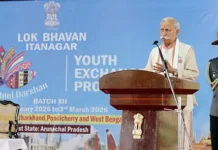ITANAGAR, 20 Jun: Itanagar is set to host HIMSamwaad 2025, a three-day national dialogue focused on the Himalayan region’s most pressing social, environmental, and policy issues. It will be held from 23 to 25 June at the state banquet hall here.
This theme for HIMSamwaad this year is ‘Health and Water: Lifelines of the Himalayas’, which aims to build awareness, deepen understanding, and generate actionable solutions for critical challenges in the region.
HIMSamwaad, now in its fourth edition, is being organized by Sewa International, the Government of Arunachal Pradesh, and the Research Institute of World’s Ancient Traditions Cultures and Heritage (RIWATCH).
Launched in 2017, the HIMSamwaad series has established itself as a vital platform where Himalayan communities, policymakers, scholars, and social organizations come together to deliberate on challenges and collaborate on sustainable solutions. “The choice of Itanagar as this year’s venue underscores the importance of bringing Northeast India’s voice into the national narrative,” informed Vani Manoraj, convener of HIMSamwaad 2025 during a press conference at the Arunachal Press Club here on Friday.
The event will host over 200 participants from across India, including policymakers, academics, researchers, social workers, environmentalists, and government officials. More than 5 expert speakers will share their insights and experiences during the sessions.
Chief Minister Pema Khandu will inaugurate the conference.
Manoraj said, “This is not just a conference; it is a commitment to connecting the lived realities of Himalayan communities with national and regional policy frameworks.
By focusing on health and water, we are centring the discussion around issues that determine the survival and dignity of mountain societies.”
The purpose of HIMSamwaad 2025 is not limited to dialogue but extends to action. A comprehensive policy recommendation report will be prepared at the end of the conference.
This report, incorporating inputs from all sessions and participants, will be submitted to state and central governments. In addition, select resolutions will form the basis for pilot projects in various Himalayan states, with a focus on innovation, local participation, and sustainability in health and water systems.
RIWATCH Executive Director Vijay Swami said that “this event is not just academic but rooted in practical thinking.” He noted that health and water are deeply interconnected issues that require integrated solutions. “Without acknowledging the region’s cultural depth, traditional healing systems, and community values, no intervention can be truly effective in the long term,” he said.
The conference will host delegates from institutions like GP Pant National Institute of Himalayan Environment, AIIMS, UNEP and UNDP, top universities, think tanks and civil society organizations. Participants will also come from all Himalayan states, including Ladakh, Uttarakhand, Sikkim, Himachal Pradesh, Arunachal Pradesh, Nagaland, and Manipur, making the event broad and diverse in its representation.
Following the event, a detailed conference report will be published summarizing key outcomes, recommendations, and action plans from the three days of dialogue. This report will be shared with policymakers, research institutions, universities, and NGOs to support long-term planning and informed policymaking at both state and national levels.

